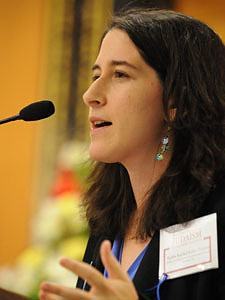In a world of endless choice, why should we place limits on what we can have? One Jewish response is found in Parshat Shmini, which contains the core of Jewish limits on food consumption with a series of laws concerning permitted and prohibited creatures.[1] It is from these laws that Jews have come to exclude pigs, camels and rabbits from our diets, along with shellfish, lizards, most insects, and birds like eagles, ostriches and ravens. While the Torah further refines some of these categories (for example, animals must chew their cud and have split hooves), there are no overarching, theoretical criteria for the limits on the Israelite diet, except to suggest that most tasty things that are not plants are forbidden from our plates.
At the end of the extensive lists of prohibited foods, this general statement offers a rationale:
For I Adonai am your God; you shall sanctify yourselves (v’hitkadishtem) and be holy (v’hiyitem kidoshim) because I am holy (kadosh) . . . For I Adonai am God who brought you up from the land of Egypt to be your God: you shall be holy (v’hiyitem kidoshim) because I am holy (kadosh).[2]
“Holiness” (Hebrew root kadosh), repeated five times in the text, is linked to the Israelites’ unique destiny as God’s people and their experience of redemption. The Israelites are instructed to pursue holiness (which includes limiting one’s diet) in order to attain the ultimate goal of imitatio dei, imitation of God’s own nature.
Though the general principle of imitatio dei in achieving holiness makes sense, its application here has always seemed strange to me. Other mitzvot ask us to imitate specific actions of God, such as visiting the sick or feeding the hungry, but because God does not eat, how are our dietary restrictions emulations of the Divine? Moreover, there seems to be a gap between the act of limiting one’s food choices and its wider goal, that of making the Israelites holy and in a state of separateness with God. How does one lead to another?
The scholar Jacob Milgrom demonstrates that the ritual and ethical aspect of being kadosh are intimately linked. He writes: “That which humanity is not, nor can ever fully be, but that which humanity is commanded to emulate and approximate, is what the Bible calls qadosh, ‘holy…’ the life of godliness.”[3] He argues that the dietary system, by severely restricting how and when the Israelites can kill animals for food, becomes “the Torah’s pre-requisite for an ethical life. Only through a daily regimen of disciplines that remind humans that life is sacred, can humans aspire to a way of life fully informed by other ethical virtues.”[4] The limits on the Israelites’ consumption become a gateway into a pursuit of other venues for achieving holiness.
Today, it seems like our choices as consumers are endless. We enjoy fruit out of season flown in from all over the globe. We drink water for pennies a glass without worrying that it might run out. We are ever encouraged to replace our cell phones, computers and TVs with the hottest, newest technology. Yet these choices are not without consequences. Each purchase we make has ethical implications, hidden costs and far-reaching impact—on the environment, the global economy and the people who work to grow or manufacture each product.
One approach to consuming more responsibly is to make small compromises that acknowledge the ethical impacts of our purchases. In essence, these are substitutions: Fair Trade coffee for regular to support fair wages for farmers; fabric sacks instead of plastic bags to reduce environmental impact; and carbon offsets to make up for travel and other excessive energy use. These substitutions are an important first step because they spark in us a desire to consider the broader ethical implications of our choices.
The model of our parshah, however, is one of restriction rather than substitution: we are limiting the infinite choices that face us, and restricting ourselves to a narrow menu. In becoming kadosh, God asks us to consume thoughtfully and with respect for human life.
The parshah also asks us to consider these restrictions within the context of an overall ethical framework of holiness. To do so, we have to stop defining ourselves primarily as consumers, even ethical ones, but as activists bent on creating lasting change. We need to understand the truth about how goods are produced. Then we need to pursue political solutions to the inequalities and environmental degradation that are the consequences of the choices we often take lightly.
When we think like activists, becoming more than just our stomachs or our wallets, we set ourselves on a path towards oneness with God. Imitatio dei means thinking beyond instant gratification to setting limits on our lives in pursuit of the sacred. When we recognize this framework, we begin to answer God’s call: kedoshim tihiyu—you shall be holy because I am holy.
[1] Leviticus 11: 1-43.
[2] Leviticus 11: 44-45.
[3] Milgrom, Jacob. Leviticus. Fortress Press: Minneapolis, 2004. p. 107.
[4] Ibid. 108.

